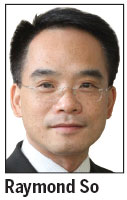Excessive hospitality, or insight?
Updated: 2013-08-29 06:36
By Raymond So(HK Edition)
|
|||||||
Last week we read how several lawmakers and one member of the Executive Council received excessive hospitality from an airline company. According to the quoted sayings from those involved, the airline company invited them to France to witness the transfer of a brand new airplane from the manufacturer to the company. The visit was supposed to be a business trip, so that lawmakers could have more insights on the airline industry. This is an important trip because aviation policy is a key public policy in Hong Kong. If the lawmakers do not understand the industry, they cannot make candid and valuable comments and suggestions.
When the details of the visit were exposed to the media, people started to question if this visit was really necessary. According to the itinerary, apart from attending the ceremony and a presentation, there was also some free time for sightseeing. Worst still, in some cases the spouses were invited as well. This gave people the impression that lawmakers received excessive hospitality from the airline company. Bringing their own spouses on the trip further strengthened the general public's perception that this was a leisure trip, rather than an official visit.

I would say that we should be careful interpreting this incident. First, the lawmakers declared the invitation according to established rules and procedures. From this point of view, the lawmakers understand that hospitality can be considered as a favor, and they declared this in accordance with existing rules. If we think they are not doing things correctly, it is a matter of perception and inference, not based on rules. According to Legislative Council records, many lawmakers have received similar acts of hospitality from airlines. If we think the current one is problematic, we should treat previous ones the same way. We cannot just say that lawmakers are not doing things correctly based on subjective feelings. By saying this, I do not mean that I support the lawmakers. What I want to say is that the lawmakers' behavior was reported, and under the current system, we cannot ask for more than that.
The second point we need to take note of is that there is a changing general perception on the expected behavior of public figures. Nowadays people have a low tolerance for potential favorable treatments received by public figures. If the lawmakers were perceived to have received excessive hospitality from the airline company, then people will start to think the lawmakers are not righteous. This is a tricky point because people's perception can change over time. Perception is not based on existing rules, but ever-changing social opinions.
Worse still, public opinion is not only dynamic, but also hard to predict. For a public figure, it is important to possess enough political sensitivity to distinguish between dos and don'ts. In the future, it is reasonable to assume there may be many declarations of potential conflict of interest, as well as different forms of hospitality. The current example illustrates that it will not hurt to have excessive declarations, no matter how minor the declaration is.
The third point is the blurred line on the difference between excessive hospitality and interaction between lawmakers and the industry. We all know that there are some pressing issues in the airline industry. Topics like the construction of the third runway, the opening of the sky and the entry of new airlines into the local markets are all in discussion. Lawmakers should be familiar with these issues because they are supposed to express their professional views to defend public interests. However, if the lawmakers want to do their jobs well, they need to have interactions with the industry. Getting too close will give people the impression there could be collusion between the industry and the lawmakers. But, if lawmakers keep a distance from the airline company, they cannot get first-hand information and will not be able to make well-informed decisions. Thus, drawing the line between normal interaction and excessive hospitality demonstrates that this is not an easy task.
The incident also shows how sensitive Hong Kong is nowadays. Things can become political in a short time. In the worst scenario, people will choose to adopt the "do less" approach so as to minimize the probability of making mistakes. Personally I do not want to observe this happening, but the sad reality is, many public decisions are now based on this philosophy.
The author is dean of the School of Business at Hang Seng Management College.
(HK Edition 08/29/2013 page9)